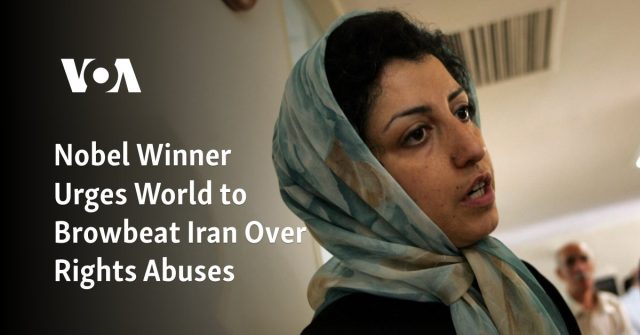Jailed Iranian Nobel Peace Prize winner Narges Mohammadi on Monday called on countries to increase pressure on Tehran over its “egregious” human rights abuses.
Mohammadi, 51, won the 2023 award for her campaign for human rights in Iran which has seen her spend much of the last two decades in and out of prison.
“The people of Iran are enduring systematic, widespread and institutionalized human rights violations,” she told a U.N. Human Rights Council session on Iran, in a message read out on her behalf.
“With the recent surge in protests and the Woman, Life, Freedom movement, repression has escalated targeting not only political dissidents but also women, religious minorities and ethnic groups,” she said.
“The U.N. and human rights organizations worldwide must exert systematic and comprehensive pressure on the Islamic republic, holding it accountable for its egregious violations of human rights.”
Mohammadi is detained in Tehran’s Evin prison, and her message was read out by the nongovernmental organization Together Against the Death Penalty.
Executions spike
The Nobel laureate urged the council to renew the mandate of Javaid Rehman, the council’s special rapporteur on the situation of human rights in Iran, and also of an independent international fact-finding mission investigating the deadly crackdown on protests that erupted in 2022.
Both mandates are due to end next month. Tehran does not engage with either.
“I remain very concerned at the ongoing executions and spike in death penalty sentences observed,” Rehman said as he presented his latest report to the rights council.
“At least 834 people were executed in 2023 — a 43-percent increase compared to 2022.”
In jail, Mohammadi “suffers from severe health issues, including serious heart and lung conditions, placing her health at great risk,” he added.
Responding to Rehman, Tehran’s representative Somayeh Karimdoost said the report was “not factual nor is it professional,” let alone fair or reflective of Iran’s “constant progress in promotion and protection of human rights.”
Iran was rocked by widespread demonstrations sparked by the September 2022 death of Mahsa Amini, a 22-year-old Iranian Kurd who had been arrested for allegedly violating the strict dress rule for women based on Islamic sharia law.
In its report on the crackdown, the fact-finding mission said many of the violations uncovered “amount to crimes against humanity — specifically those of murder, imprisonment, torture, rape and other forms of sexual violence, persecution, enforced disappearance and other inhumane acts.”
The mission’s chair Sara Hossain told a news conference that Tehran had failed to recognize the protests and had also tried to “silence all those who are still seeking justice.”
Intimidate, abuse, imprison
Kazem Gharib Abadi, head of Iran’s High Council for Human Rights, said the mission had a “glaring lack of independence and impartiality,” and sought to “obfuscate and distort the realities.”
A long line of diplomats took the floor to decry events in Iran.
“Sixteen of the 24 women executed worldwide in 2022 were executed in Iran,” noted France’s Ambassador Jerome Bonnafont.
U.S. Ambassador Michele Taylor said Iran continued to “intimidate, abuse and imprison” rights activists, journalists, lawyers, religious minorities, cultural figures and political dissidents.
Representatives of countries including Russia, China, and North Korea came to Tehran’s defense.
As the session went ahead, about 50 people demonstrated outside the U.N. building, calling on the organization to act against Iran.






















